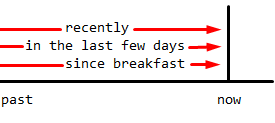Present perfect (parte 2)
 Como visto anteriormente nos posts anteriores sobre present perfect, a estrutura do Present perfect simple é composta por have/has+ past participle. Vimos também que o past participle geralmente termina com ed (finished/decided etc.), e que, porém, muitos verbos importantes são irregulares. Temos aqui uma lista dos 100 verbos irregulares mais populares em Inglês. Os outros dois posts anteriores estão disponíveis nos links logo abaixo:
Como visto anteriormente nos posts anteriores sobre present perfect, a estrutura do Present perfect simple é composta por have/has+ past participle. Vimos também que o past participle geralmente termina com ed (finished/decided etc.), e que, porém, muitos verbos importantes são irregulares. Temos aqui uma lista dos 100 verbos irregulares mais populares em Inglês. Os outros dois posts anteriores estão disponíveis nos links logo abaixo:
Present Perfect Simple (resumido)
Present perfect (parte 1)
Neste post vou falar sobre outras 4 situações onde se usa present perfect simple:
1) Quando falamos de um período de tempo que continua do passado até agora, usamos o present perfect simple (have been / have traveled etc.). Vejamos um dialogo onde Mike Mary estão falando sobre os lugares que Mary você visitou em sua vida, que é um período que continua até agora:
MIKE: Have you traveled a lot, Mary?
MARY: Yes, I’ve been to* lots of places.
MIKE: Really? Have you ever been to* China?
MARY: Yes, I’ve been to* China twice.
MIKE: What about India?
MARY: No, I haven’t been to* India.
*Been (to)= visited:
I’ve never been to China. Have you been there?
Note que que no dialogo acima eles falam sobre experiencias que Mary teve em sua vida, que é um período de tempo que continua do passado até agora. Em Português, o natural seria dizer algo como:
MIKE: Você viajou bastante, Mary? Have you traveled a lot, Jane?
MARY: Sim, fui para vários lugares. Yes, I’ve been to lots of places.
MIKE: Sério? Você alguma vez foi para a China? Really? Have you ever been to China?
MARY: Sim, fui para a China duas vezes. Yes, I’ve been to China twice.
MIKE: E a India? What about India?
MARY: Não, eu nunca estive na Índia. No, I haven’t been to India.
Porém em Inglês é assim, se usa o present perfect nesse caso. Vamos ver mais alguns exemplos:
- Have you ever eaten caviar?
- We’ve never had a car.
- Have you read Hamlet?’ I No, I haven’t read any of Shakespeare’s plays.’
- Susan really loves that film. She’s seen it eight times!
- What a boring movie! It’s the most boring movie I’ve ever seen.
2) Nos seguintes exemplos, também, as pessoas estão falando sobre um período que continua até agora usando algumas expressões (recently / in the Last few days / so far / since breakfast etc.):
- Have you heard anything from Brian recently?

- I’ve met a lot of people in the Last few days.
- Everything is going well. We haven’t had any problems
so far. - I’m hungry. I haven’t eaten anything since breakfast. (from breakfast until now)
- It’s good to see you again. We haven’t seen each other for a Long time.
3) Da mesma forma usamos o present perfect com today / this evening / this year etc. quando estes períodos não estão terminados no momento em que se está falando:
- I’ve drunk four cups of coffee today.

- Have you had a holiday this year?
- I haven’t seen John this morning. Have you?
- Tom hasn’t studied very hard this semester.
4) Quando dizemos que é a primeira, segunda, terceira etc. vez que algo acentece, usamos o present perfect assim: It’s the (first) time something has happened.
Por exemplo:
- Daniel is having a driving lesson. It’s his first one.
It’s the first time he has driven a car. (not drives)
or
He has never driven a car before. - Jennifer has lost her passport again. This is the second
time this has happened. (not happens) - Robert is phoning his girlfriend again. That’s the third
time he’s phoned her this evening.
See you next time!
[…] Este post é um resumo geral do tempo verbal. Porém, tenho outras postagens sobre present perfect simple que você pode acessar nos links a seguir: Present perfect (parte 1) Present perfect (parte 2) […]